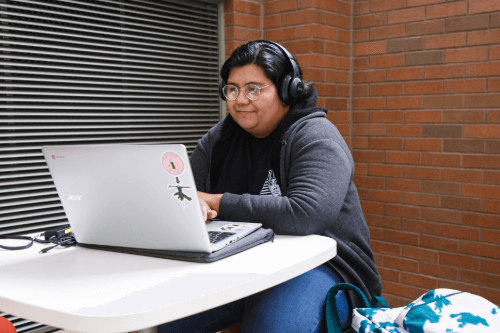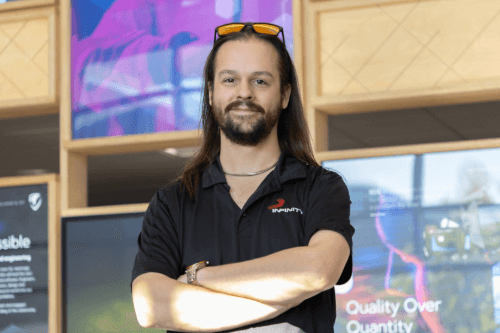When most people hear the word “research,” they probably think of lab coats, test tubes, and graduate students or Ph.Ds. analyzing data. Those things can be true; but it is not always the case. Students in the Laboratory Science Technology program at NWTC conduct scientific research for their capstone project, working with research scientists and experienced mentors to finish their associate degrees. During the capstone, students test a unique hypothesis and present their findings to the community at Laboratory Science Spotlight Night.
“Sometimes, students feel like an ‘imposter’ in the sciences,” said Dr. Matthew Petersen, adjunct Biology faculty and NWTC’s Manager of Student Retention. “They think that you have to wear a white lab coat and know everything there is to know before you even start – that could not be further from the truth.”
Josephine Schmitt, a student in the Laboratory Sciences program, is researching the chemical composition of different perfumes. She hypothesized that two different perfume brands (one a name-brand item and the other a copycat) share the same chemical composition. The research is based on organic chemistry and uses gas chromatography and ultraviolet-visible spectroscopy (two processes used for separating chemical compounds and analyzing their composition) to compare ingredients.
“It’s rewarding to see students grow in their confidence and problem-solving skills as they progress from the initial creation of a research question to performing the experiments to finally presenting their results,” said Dr. Petersen.
For Josephine, conducting research during her associate degree program has helped her find a clear path through her education.
“I had originally planned to pursue a bachelor’s degree in human biology after graduating from NWTC,” said Schmitt. Now, after conducting research, her plans have changed. “I plan to major in cell and molecular biology... and continue to pursue research studies during graduate school.”
Studies show that undergraduate research opportunities help students improve communication skills, problem-solving abilities, and scientific reasoning. Research is a unique challenge and helps students stand out by participating in something different than their peers.
When asked to share advice for future students interested in experiencing research, Schmitt shared that the "key to working in a team is to stay communicative and not let ‘failed’ experiments get to you. Studies are about trial and error, and that is how we refine the scientific theories and laws we have today.”
To us, that sounds exactly like something a scientist would say.
“By the time the students finish their research, they are experts in their project,” said Dr. Petersen. “They feel like scientists because they truly are.”
If you’re interested in learning more about undergraduate research opportunities and would like to see our students present their findings, or are interested in Laboratory Science Technology, stop by the Green Bay campus Welcome Center for Spotlight Night on Friday, April 28, from 3:30 to 5:30 p.m.




